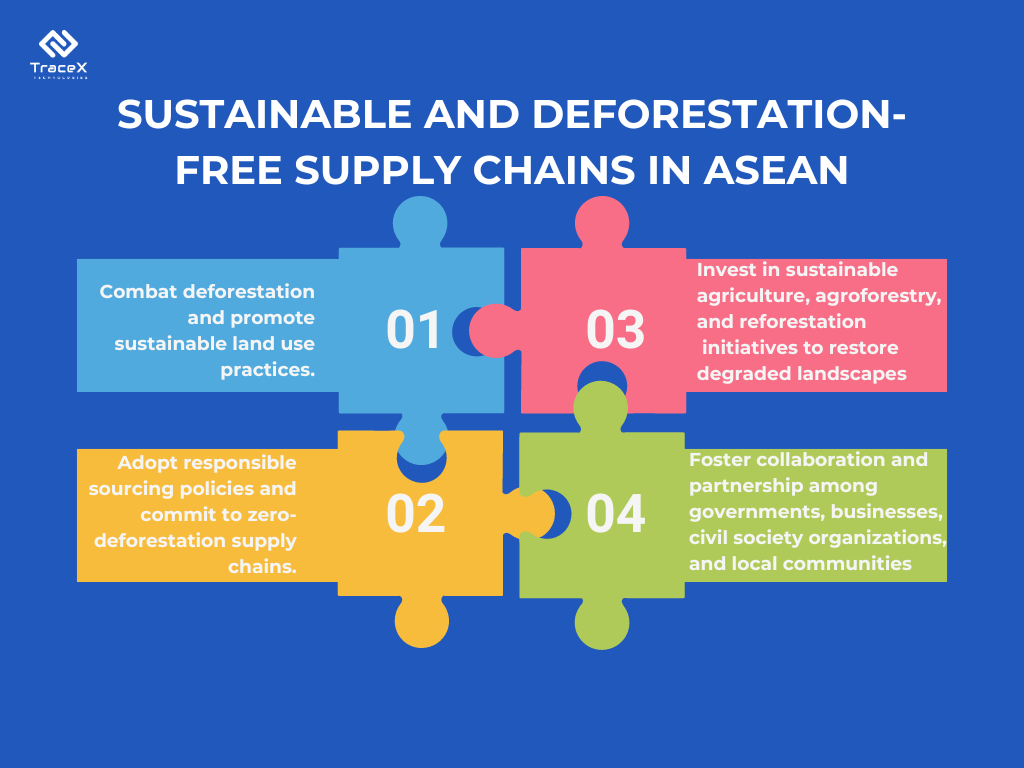Contact: +91 99725 24322 |
Menu
Menu
Quick summary: Explore the complex landscape of deforestation regulations in Southeast Asia and learn how sustainable supply chains are crucial for addressing this pressing issue. Discover the role of traceability solutions like TraceX in promoting transparency and accountability, driving positive change for forests, ecosystems, and communities.

Southeast Asia, a region brimming with biodiversity and vibrant ecosystems, is also a hotspot for agricultural production. However, this economic growth has come at a cost – rampant deforestation. To combat this environmental crisis, the evolving landscape of deforestation regulations in ASEAN(Association of Southeast Asian Nations) is pivotal in shaping sustainable supply chains across this region.
The deforestation rate in Southeast Asia is among the highest globally, driven by the region’s agricultural and food production needs, alongside other industries requiring raw materials.
Southeast Asia, encompassing Indonesia, Malaysia, Vietnam, and Thailand, harbours approximately 15% of the planet’s tropical forests, heightening its significance as a deforestation epicentre. With deforestation rates soaring, the region witnesses an annual loss of forests amounting to at least 1.2%.
Southeast Asia faces the challenge of balancing economic development with environmental conservation. Rapid urbanization, agricultural expansion, logging, and infrastructure projects have led to widespread deforestation, resulting in the loss of vital ecosystems such as tropical rainforests and mangrove forests. This rampant deforestation not only threatens biodiversity but also exacerbates climate change by releasing large amounts of carbon dioxide into the atmosphere. Moreover, indigenous communities and marginalized groups often bear the brunt of these environmental changes, facing displacement and loss of livelihoods. Addressing the deforestation dilemma requires concerted efforts from governments, businesses, civil society, and local communities to implement sustainable land-use practices, strengthen forest protection measures, and promote alternative sources of income that are compatible with conservation goals.
Across Southeast Asia, lush rainforests are vanishing at an alarming rate. Driven by factors such as the expansion of palm oil plantations, pulp and paper production, and illegal logging, deforestation has devastating consequences. These include:
Take action against illegal logging today. Join us in our efforts to protect our forests and ensure sustainability.
Recognizing the urgency of the situation, ASEAN member states have adopted a range of regulations aimed at tackling deforestation. These regulations vary in strictness and implementation, but they generally focus on:
Here are some prominent ASEAN deforestation regulations impacting various sectors:
The EUDR goes beyond timber, encompassing other deforestation-linked commodities like soy, cocoa, coffee, palm oil, rubber, and beef. The EUDR enforces stricter due diligence requirements. Operators must not only verify the legality of the source, but also ensure the commodities are not linked to deforestation. This requires robust traceability systems to track the origin of the product throughout the supply chain. ASEAN producers exporting these commodities to the EU will need to implement robust due diligence systems and demonstrate deforestation-free production practices. This presents both challenges and opportunities for sustainable forestry management in the region.
The EUDR represents a significant step forward for the EU in promoting sustainable global trade. While the EUTR focused on legality within the EU, the EUDR takes a more holistic approach, aiming to address deforestation at its source. For ASEAN timber producers, the EUDR presents a challenge to adapt and improve their practices. However, it also creates an opportunity to participate in a more environmentally conscious global market, potentially leading to long-term benefits for both the environment and the region’s economy.
Complying with ASEAN deforestation regulations can pose challenges for businesses operating in the region. Here are some key hurdles:
However, navigating these challenges also presents opportunities for businesses:

Technology plays a crucial role in ensuring compliance with deforestation regulations.
Blockchain Technology: This secure system can be used to track the origin of raw materials throughout the supply chain, providing verifiable data on their source and sustainability practices.
Satellite Monitoring: Satellite imagery can be used to monitor forest cover and detect deforestation activities, enabling enforcement agencies to identify potential violations.
Mobile Apps: Apps can be developed to empower farmers and businesses to collect and share data on sustainable practices, facilitating compliance efforts.
TraceX supply chain traceability solutions offer a robust framework for ensuring compliance with deforestation regulations by combining blockchain technology, satellite monitoring, and mobile app accessibility to track the origin and sustainability practices of raw materials throughout the supply chain.
TraceX platform utilizes blockchain technology to create an immutable record of every transaction and movement within the supply chain. By recording the origin of raw materials and their journey through the supply chain, TraceX ensures transparency and traceability, enabling stakeholders to verify the sustainability practices associated with each product. TraceX integrates satellite monitoring data to track forest cover and detect any signs of deforestation along the supply chain. By continuously monitoring changes in forest landscapes, the system can identify potential violations of deforestation regulations, allowing authorities to take timely action to prevent further harm. TraceX provides a user-friendly mobile application that empowers farmers and businesses to collect and share data on sustainable practices directly from the field. Through the app, stakeholders can document their compliance efforts and contribute to the overall transparency and accountability of the supply chain.
Effective implementation of ASEAN deforestation regulations requires collaboration between various stakeholders:
In conclusion, addressing deforestation in Southeast Asia requires a multifaceted approach involving collaboration between governments, industries, NGOs, and local communities. While regulations are essential for setting standards and enforcement, sustainable supply chains play a crucial role in driving real change on the ground. By adopting traceability solutions like TraceX, businesses can ensure transparency and accountability throughout their supply chains, reducing the risk of sourcing from illegal or unsustainable practices. With concerted efforts and innovative solutions, we can strive towards a future where forests are protected, ecosystems are preserved, and communities thrive in harmony with nature.
